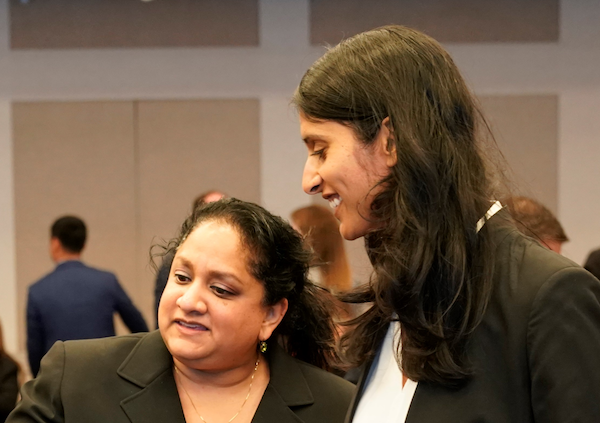Cham Dallas
See the following -
Experts Warn Of Antimicrobial Resistance, Additional Threats To National Biosecurity
 Dr. Asha George...was among a panel of experts testifying about the state of U.S. preparedness for biological attacks and infectious disease pandemics. The experts agreed that a range of factors affect our country's ability to fight these threats, including weakened or fragmented federal oversight, limited incentives for research and development, and a lack of preparedness at the local level to protect vulnerable populations. "In short, the nation is not prepared for biological outbreaks, acts of bioterrorism, biological warfare of accidental releases with catastrophic consequences," George said. "We are talking about catastrophic events that affect the function of our entire society."
Dr. Asha George...was among a panel of experts testifying about the state of U.S. preparedness for biological attacks and infectious disease pandemics. The experts agreed that a range of factors affect our country's ability to fight these threats, including weakened or fragmented federal oversight, limited incentives for research and development, and a lack of preparedness at the local level to protect vulnerable populations. "In short, the nation is not prepared for biological outbreaks, acts of bioterrorism, biological warfare of accidental releases with catastrophic consequences," George said. "We are talking about catastrophic events that affect the function of our entire society."
- Login to post comments
Biodefense Takes Center Stage at House Oversight Hearing
 Is the nation ready to defend against antibiotic-resistant diseases or bioterrorism? What would the response to a biological attack or disease pandemic look like? Those threats and the collaboration of private, federal and local agencies to respond to them were the focus of a hearing Wednesday in the House Oversight Subcommittee on National Security on biodefense preparedness. Congressman Stephen Lynch, D-Mass., said at the beginning of the hearing that around 2.4 million people could die in high-income countries between 2015 and 2050 without an effort to contain antimicrobial resistance, according to an April report to the Secretary-General of the United Nations.
Is the nation ready to defend against antibiotic-resistant diseases or bioterrorism? What would the response to a biological attack or disease pandemic look like? Those threats and the collaboration of private, federal and local agencies to respond to them were the focus of a hearing Wednesday in the House Oversight Subcommittee on National Security on biodefense preparedness. Congressman Stephen Lynch, D-Mass., said at the beginning of the hearing that around 2.4 million people could die in high-income countries between 2015 and 2050 without an effort to contain antimicrobial resistance, according to an April report to the Secretary-General of the United Nations.
- Login to post comments
Medicine and Public Health in Nuclear War Diplomacy and Response
 The world is not prepared to deal with the devastating effects of a thermonuclear attack, according to Cham Dallas, professor of public health and director of the Institute for Disaster Management at the University of Georgia. Dallas said that the development of a hydrogen bomb by North Korea is a transformative event, especially from the point of view of the medical and public health response to a thermonuclear detonation...
The world is not prepared to deal with the devastating effects of a thermonuclear attack, according to Cham Dallas, professor of public health and director of the Institute for Disaster Management at the University of Georgia. Dallas said that the development of a hydrogen bomb by North Korea is a transformative event, especially from the point of view of the medical and public health response to a thermonuclear detonation...
- Login to post comments
What If It Happened Again? What We Need To Do To Prepare For A Nuclear Event
 As we observe the 70th anniversary of the bombings of Hiroshima and Nagasaki, it may seem like the threat from nuclear weapons has receded. But it hasn’t; the threat is actually increasing steadily. This is difficult to face for many people, and this denial also means that we are not very well-prepared for nuclear and radiological events. I’ve been studying the effects of nuclear events – from detonations to accidents – for over 30 years. I’ve been involved in research, teaching and humanitarian efforts in multiple expeditions to Chernobyl- and Fukushima-contaminated areas. Now I am involved in the proposal for the formation of the Nuclear Global Health Workforce.
As we observe the 70th anniversary of the bombings of Hiroshima and Nagasaki, it may seem like the threat from nuclear weapons has receded. But it hasn’t; the threat is actually increasing steadily. This is difficult to face for many people, and this denial also means that we are not very well-prepared for nuclear and radiological events. I’ve been studying the effects of nuclear events – from detonations to accidents – for over 30 years. I’ve been involved in research, teaching and humanitarian efforts in multiple expeditions to Chernobyl- and Fukushima-contaminated areas. Now I am involved in the proposal for the formation of the Nuclear Global Health Workforce.
- Login to post comments